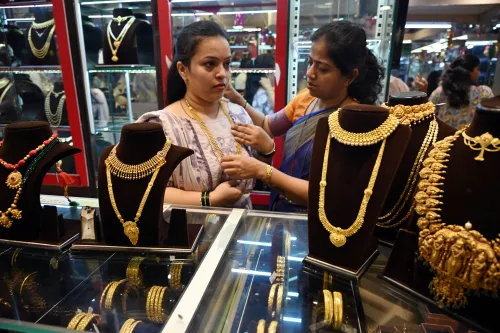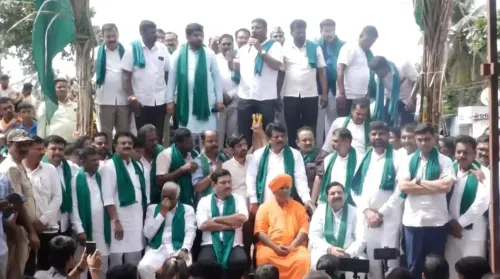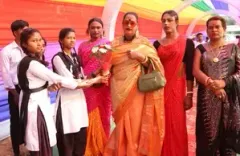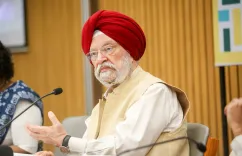Rajendra Shah Commends PM Modi's Profound Insight on Jainism
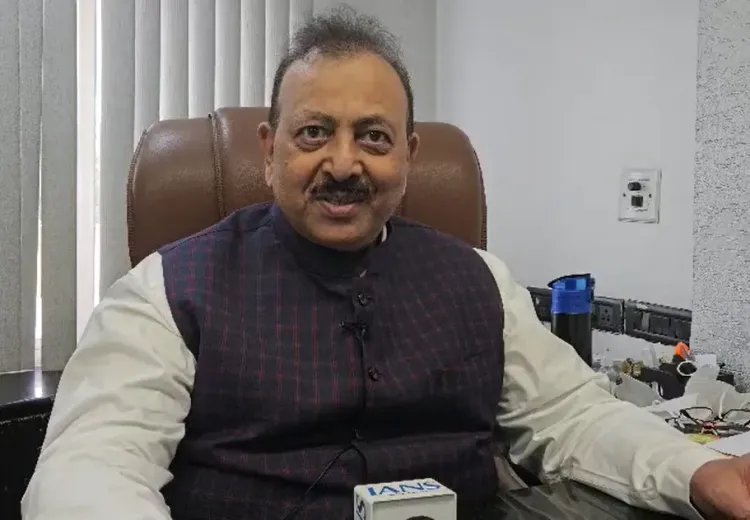
Synopsis
Key Takeaways
- PM Modi's deep insight into Jainism.
- Emphasis on collective well-being and nine resolutions.
- Advocacy for indigenous products for economic self-reliance.
- Call to celebrate domestic events to boost local economy.
- Connection between Jain values and environmental consciousness.
Ahmedabad, April 11 (NationPress) The Chairman of SAL Hospital & Medical Institute, Rajendra Shah, commended Prime Minister Narendra Modi for his profound and intricate understanding of Jain philosophy, showcased during his address at the ‘Navkar Mahamantra’ Day festivities organized by the Jain International Trade Organisation (JITO) in Delhi on April 9.
He remarked: "The Prime Minister infused divine energy into the recitation of the Navkar Mantra. His presence completely transformed the ambiance. The way he articulated the core essence of Jainism surpassed what one might expect from a religious scholar. His knowledge is beyond what an ordinary person can convey; only someone endowed with rare divine power can speak with such depth and insight about a faith."
Rajendra Shah further reminisced: "I was the first to publicly declare in 2002 that Modi Ji embodies the qualities of a Yugpurush (a person of the era). Just as a great soul like Mahatma Gandhi emerges once in a century, Modi Ji possesses that divine energy. Now, everyone witnesses that he truly is a Yugpurush. No one else could have delivered such a profound and spiritually resonant address. His discourse on Jainism stems from someone with a divine mission."
Shah emphasized that the Prime Minister's remarks were not only spiritually uplifting but also grounded in a vision for universal welfare.
“He spoke about collective well-being—promoting goodness for everyone, for the world. He shared nine resolutions, Nav Sankalp, urging people to incorporate them into their lives to elevate India to number one. I am confident that if everyone embraces these sankalps, India will indeed become number one.”
Focusing on PM Modi’s advocacy for economic self-reliance, Shah stated: "The Prime Minister encouraged individuals to support indigenous products to lessen reliance on foreign goods. He associated this with lowering unemployment and bolstering the economy. He provided a simple yet impactful example—planting a tree in honor of your mother (Ek ped Maa ke naam). This can decrease energy consumption by 20 percent, as trees help lower temperatures. It’s a straightforward act, but with significant economic consequences.”
Shah recounted a personal dialogue where PM Modi expressed concern that India, despite being an agriculture-based nation, still imports food oils worth ₹1 lakh crore. "He questioned, 'Can we truly call ourselves an agriculture-based country while importing food oil on such a massive scale?' He advocated for reduced oil consumption for improved health and a potential savings of ₹10,000 to ₹20,000 crore annually, contributing to national development."
"He even encouraged me to advise my friends against holding weddings abroad. He said, ‘Why not celebrate within India? A significant portion of our wealth is spent abroad. Travel to foreign countries if you wish, but commemorate your special occasions here and explore our nation.’ His message was clear—spending domestically will enhance employment opportunities and alleviate poverty.”
Shah admired how PM Modi’s entire message revolved around nation-building, propelled by compassion, patriotism, and service to humanity—values that are central to Jainism.
"He elucidated the fundamental principle of Jainism—that aiding the impoverished is the true essence of religion. He linked Jain values to environmental awareness, stressing that every living being has a right to exist. He spoke of non-violence, a core tenet of Jainism, and explored the nine aspects of the Navkar Mantra, even detailing the meaning of 'Arihant'."
He warmly recalled that PM Modi had laid the groundwork for JITO.
"He was the chief guest at our inaugural event—even before the name JITO was finalized. The small seed he sowed has blossomed into a magnificent banyan tree. I am genuinely astonished by his understanding of religion—this level of wisdom is rare among ordinary individuals."
Shah also shared his perspective on the identity of the Jain community.
"I personally disagree with the idea that the Jain community is a minority. I think it’s a misconception. In school records, Jains used to list ‘Hindu’ as their religion. All the Tirthankaras were Rajput kings—Hindus. Similar to Vaishnavism or other sects, Jainism is also a spiritual path within the broader Hindu framework. Jains are the intellectual backbone of our society.”
He concluded with: “Where there exists a community of such capable and self-sufficient individuals, they do not rely on the government for support. Their strength lies in contributing rather than requesting. The fundamental principle is to ensure people are happy and free from expectations.”

